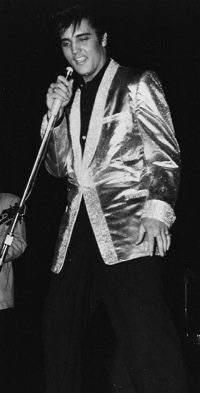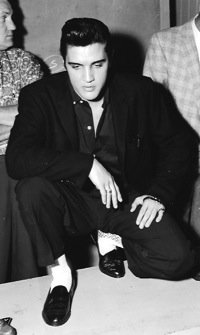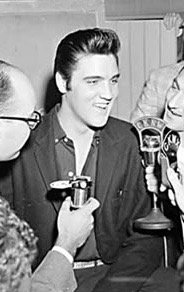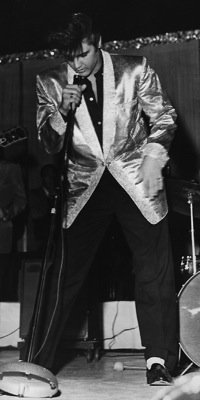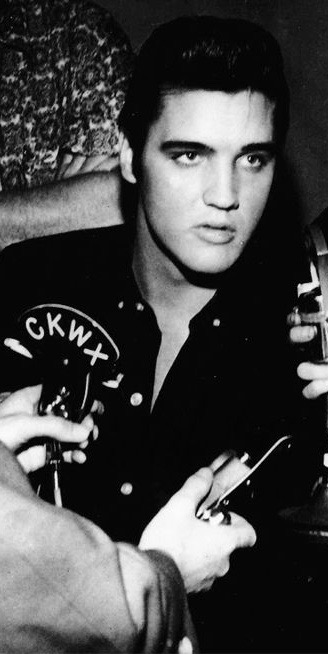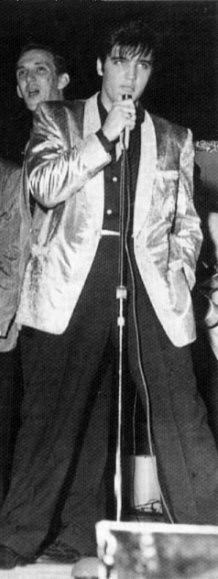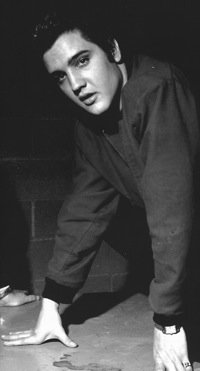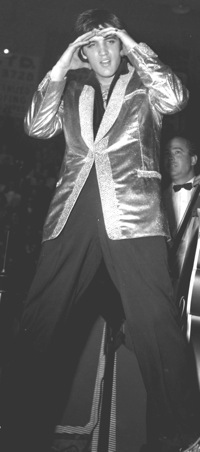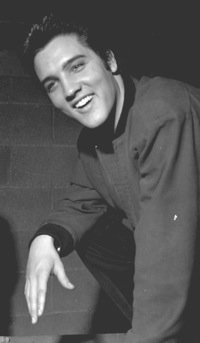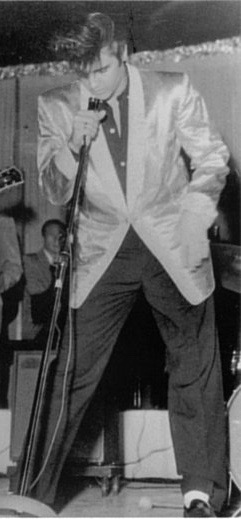Elvis History Blog
Elvis Presley in Canada
Rock 'n' Roll North of the Border
It’s common knowledge that Canada was the only country outside the United States in which Elvis Presley performed on stage. Citizens of a few other countries were fortunate enough to at least see Elvis. He spent 16 months in Germany on army duty in 1958-60. During that deployment, some French citizens (mostly chorus girls) were able to see him during two trips to Paris. And when his plane stopped briefly to refuel on his way back to the States on March 2, 1960, a fortunate few Scotland residents caught a glimpse of Elvis.
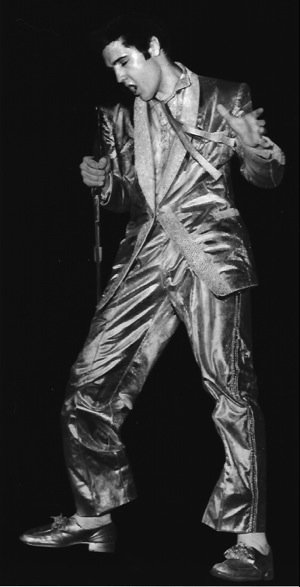
Only to Canada, though, did Presley take his stage show. For the record, in 1957 Elvis performed two shows at Maple Leaf Gardens in Toronto on April 2, two shows at the Auditorium in Ottawa on April 3, and one show at Empire Stadium in Vancouver on August 31. Although he often expressed a desire to tour in Europe and Australia, he never again performed outside the U.S.
Much has been written elsewhere about the 1957 Canadian shows (including in my own book, Elvis ’57: The Final Fifties Tours), so the focus will be on a few other Presley connections with Canada. First of all, entertainment press reports in 1956 revealed that when Presley exploded on the scene that year, Canada’s youth embraced him with fervor equal to that of American teenagers.
A short article in Variety on July 18, 1956, reported that Elvis was being blamed for bad teenage behavior north of the border: “The latest incident was a court appearance of five teenagers held after police raided a beer party where the president of the Ottawa Elvis Presley Fan Club pleaded guilty to participating. When police walked in, Presley pictures were on the walls, Presley disks were on the record players, ‘I Love Elvis’ badges were on blouses and skirts. ‘It’s a pain in the neck,’ said a policeman.” Variety further reported that Honorious Belesque, the 18-year-old mayor-elect of Aylmer, Quebec’s “Teen Town” had urged a ban on Presley’s teenage followers. “Belesque favored a more ‘liberal’ trend in music, but said that Presley’s songs are suggestive.” Local jukebox operators, however, were not about to remove the popular Presley records from their machines.
• Elvis records sold at record pace in Canada
The bad press didn’t discourage Canadians from buying Presley’s records, as Billboard reported in its December 8, 1956, issue:
“Sales of the Elvis Presley records continue to soar and to set new sales marks. In a country, where the top record usually may hit the 100,000 mark, two of Presley’s biscuits have shot over that mark, with ‘Hound Dog’ and ‘Don’t Be Cruel’ coupling racking up a total exceeding 225,000 in 14 weeks, while Presley’s ‘Love Me Tender’ has spilled out 135,000 in six weeks. Victor says that ‘Don’t Be Cruel’ is probably the biggest single in the history of the company in Canada. Advance orders for the new Presley album, ‘Elvis,’ are pushing around the 30,000 mark, which is considered excellent against the 150,000 total for the whole of the U.S.A.
“Presley is a strange phenomenon for this country. Not only have his record sales broken all previous marks, but dealers credit the interest created by his sales for a boom year for the record industry. For instance, sales of guitars in the Toronto and Montreal areas have boomed, with some dealers reporting that orders are behind as much as six weeks. Fred Roden, operator of the country and western music store in Toronto, said that his guitar sales have been ‘terrific—all due to Presley’ … Presley appeals to the [Canadian] French population as well as the English.” (Below: Elvis in Ottawa, April 3, 1957)
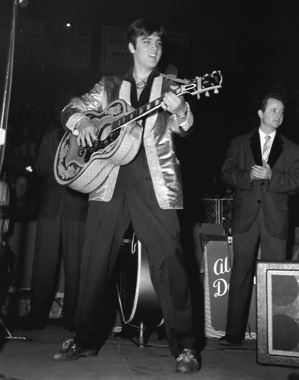
Elvis’ popularity in Canada resulted in Colonel Parker booking stops in Toronto, Ottawa, and Montreal on Presley’s spring tour in 1957. When the Toronto Telegram learned of his upcoming April 2 appearance in the city, a reporter called Elvis in Memphis to ask him about coming to Canada. The paper reported that Elvis decided to play Toronto after receiving 40,000 Christmas cards from the Toronto area in 1956. “I’ve got a tremendous following up there,” Presley told the reporter. “One girl alone collected 2,000 signatures for me to appear in Toronto.”
After the Toronto shows on April 2, Presley moved on to Ottawa, where he gave a pre-show interview to local DJ Gord Atkinson. Asked his impressions of Canada, Elvis responded, “I was in Toronto last night, and I was very much surprised by how wonderful the people are. How friendly, you know, in this part of the country. I have been wanting to come up here. In fact, when I started looking at the tour, I said, ‘By all means. I want to go to Canada.’ About a year ago, I tried to get them to book a tour up here but I wasn’t well enough known.”
• Church objections caused cancellation of Montreal show
The next day, April 4, Elvis had been scheduled to appear at the arena in Verdun, a suburb of Montreal. However, before the tour had even begun, that show had been cancelled due to various civic concerns. About 500 Montreal teenagers, however, were able to see Elvis’ evening show in Ottawa on April 3, when a special train carried them there and home again that day.
Presley’s controversial show in Vancouver, B.C., on Labor Day weekend in 1957 resulted in a strong backlash from city officials. The crowd in Empire Stadium on August 31 was the second largest crowd Elvis had faced to that point. When thousands spilled out on the field and advanced toward the stage, overwhelming the police officers trying to hold them back, Colonel Parker decided to end the concert early. Vancouver Province columnist Hugh Watson reported Elvis’ response to the Vancouver crowd: “Without doubt this was the worst audience I ever played to. Only my first time in Chicago would compare with it. I’d heard that Canadians were a little more rational. Still, they seemed to like it.” (Below: Elvis crowd in Vancouver, B.C., August 31, 1957)
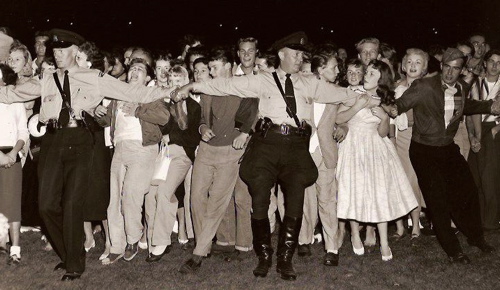
City officials were not as understanding. Several days later, Vancouver Sun columnist Jack Wasserman reported, “As far as Pacific National officials are concerned he can’t come back into Empire Stadium. Nor can any other so-called entertainer who appeals to the same type of thing. While officials felt that Elvis was a fine boy and his manager, Col. Tom Parker, was ‘most co-operative,’ they surveyed the scene of the carnage and decreed ‘Never again.’”
In the long run, though, Presley’s influence with young people in Vancouver won out. The size of the crowd that turned out for Elvis helped establish the city as a major destination for most top rock ’n’ roll acts, including The Beatles. “Vancouver was the first city in Canada to launch the brand new music form,” DJ Red Robinson noted. “Vancouver is Canada’s pioneer rock ’n’ roll city and proud of it.”
• Canada radio stations banned Elvis’ Christmas music
It would take awhile, however, for many of Canada’s radio stations to accept Elvis. Within a week of his 1957 appearance in Vancouver, he was in Los Angeles recording his first holiday album. When it was released in December, many American critics were repulsed by Presley’s treatment of some traditional Christmas songs and hymns. It was from radio stations north of the border, however, that “Elvis’ Christmas Album” received the most criticism and banishment from the airwaves. In Vancouver, all six of the town’s radio stations agreed to a proposed ban on Elvis’s holiday recordings.
Radio station CKXL in Calgary also banned Elvis’ album. “Presley’s latest release has, we feel, no place on our station,” said a CKXL spokesman. “We have the album for audition—it speaks for itself. Presley sings the Christmas songs exactly as we expected he would. It is one of the most degrading things we have heard in some time.” He described Presley as “panting” through the hymns “Silent Night” and “O Little Town of Bethlehem.” Another Calgary station, CFCN, denied an official ban, but stated Elvis’ album “would not be played because it happens to be in lousy taste.”
In Toronto, station CFRB banned the album, declaring, “there are better interpretations of Xmas hymns.” Gordon Sinclair, columnist for the Toronto Star, condemned Presley’s rock ’n’ roll treatment of Christmas carols. “Only Mahalia Jackson could jazz the hymns,” he said, adding that he disliked censorship, but found Elvis’ treatment of Christmas songs to be “wildly inappropriate.”
The Canadian Press, a news gathering organization, surveyed disc jockeys across Canada and found, while many refused to spin any cut on Elvis’ album, other stations planned to play the non-religious songs, like “Santa Bring My Baby Back to Me,” while shying away from the Christmas standards like “Silent Night.” Other stations stated they were waiting for their listeners' views before making a decision on whether or not to play the album.
The nationwide Canadian Broadcasting Corporation, however, took a progressive stand on “Elvis’ Christmas Album.” A spokesman stated, “We have no objection if listeners want to hear the Presley album and CBC disk jockeys want to play the numbers.”
• Elvis never returned to Canada
As the Christmas season of 1957 faded away, so did the Canadian controversy over Elvis’ Christmas album. All the fears of Canada’s elders that Presley would continue to contaminate the country’s youth disappeared in March 1958 when Elvis was drafted into the U.S. army.
When Elvis emerged from the military in 1960, he merged with mainstream pop music and was no longer seen as a threat to the morals of young people in the U.S. and Canada. For a decade, he abandoned stage shows for a Hollywood career. Fans in both countries could only see him perform on the screens of their local theaters.
When he returned to touring again in 1970, many Canadians hoped he would return to play their cities as he had in 1957. He never did. Still, Canadian fans who lived close to the U.S. border had occasional opportunities to see him perform if they were willing to travel south when his show came to northern tier American cities, such as Seattle, Spokane, Detroit, Buffalo, Rochester, Syracuse, Augusta, Niagara Falls, and Duluth. — Alan Hanson | © December 2014
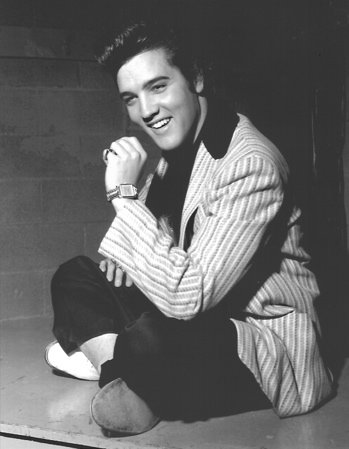
“Without doubt this was the worst audience I ever played to. Only my first time in Chicago would compare with it. I’d heard that Canadians were a little more rational.” — Elvis Presley after his 1957 show in Vancouver, B.C.
